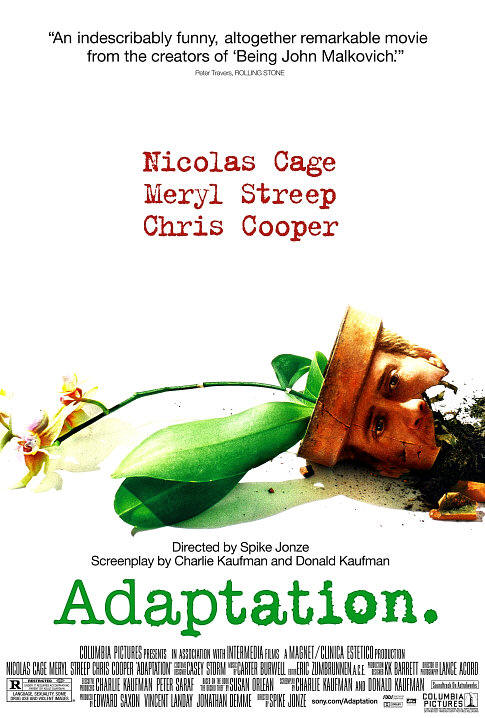 In Being John Malkovich, screenwriter Charlie Kaufman and director Spike Jonze took their audience literally inside the mind of a great Hollywood actor. With their new collaboration Adaptation, the pair now take us inside the mind of a great Hollywood writer, Charlie Kaufman. Adaptation is part autobiography, part exploration of the artistic process, part Hollywood satire and wholly original.
In Being John Malkovich, screenwriter Charlie Kaufman and director Spike Jonze took their audience literally inside the mind of a great Hollywood actor. With their new collaboration Adaptation, the pair now take us inside the mind of a great Hollywood writer, Charlie Kaufman. Adaptation is part autobiography, part exploration of the artistic process, part Hollywood satire and wholly original.
In the film, Charlie Kaufman (Nick Cage) is a Hollywood screenwriter who has suddenly become the town’s hot new thing with the success of his screenplay Being John Malkovich. He agrees to adapt the book The Orchid Thief by Susan Orlean (Meryl Streep), the true story of a rather colorful Florida botanist, even though many others have considered the book unfilmable. Charlie wants to be faithful to the book and not turn into the usual Hollywood blockbuster film. “I don’t want to make it an ‘orchid heist’ movie,” he tells the film’s producer. “I don’t want this to be a movie where everyone learns a profound life lesson at the end.”
 Unfortunately, Charlie is having a hard time trying to finding a way to translate the book into a screenplay that he would be happy with. Further aggravating his situation is his twin brother Donald, who on a whim tries his own hand at scriptwriting and quickly turns out a thriller that everyone seems to be excited about. As Charlie continues to struggle with his own writing, he finds himself attracted to the book jacket photo of Orlean. This further paralyzes him creatively as he grows afraid of disappointing the object of his growing infatuation.
Unfortunately, Charlie is having a hard time trying to finding a way to translate the book into a screenplay that he would be happy with. Further aggravating his situation is his twin brother Donald, who on a whim tries his own hand at scriptwriting and quickly turns out a thriller that everyone seems to be excited about. As Charlie continues to struggle with his own writing, he finds himself attracted to the book jacket photo of Orlean. This further paralyzes him creatively as he grows afraid of disappointing the object of his growing infatuation.
The script for Adaptation grew out of Kaufman’s own struggle to adapt Oleander’s book. One can easily imagine that the moment of “film-Charlie”’s epiphany that he should be writing about his struggles to adapt the book instead of trying to adapt the book itself mirrors the moment when the real-world Kaufman also reached that realization. It’s also at that moment when the real world Kaufman uses his filmic counterpart to concede that such a move is indeed “self-indulgent, narcissistic and solipsistic.” This is a story that folds back onto itself like a Mobius Strip at first being self-referential to the creative struggle of the real world Kaufman and then becoming exactly the type of movie that “film-Charlie” doesn’t want to write.
 The film further blur’s the line between reality and fantasy by mixing cameos of John Malkovich, John Cusack and Catherine Keener (all of whom appeared in Being John Malkovich) with actors portraying real-life figures Susan Oleander and screenwriting guru Robert McGee (Brian Cox).
The film further blur’s the line between reality and fantasy by mixing cameos of John Malkovich, John Cusack and Catherine Keener (all of whom appeared in Being John Malkovich) with actors portraying real-life figures Susan Oleander and screenwriting guru Robert McGee (Brian Cox).
Cage’s performance as the Kaufman twins is probably one of his best in years, imbuing both characters with enough differing physicality to make it easy for the audience to identify which brother is on screen before any dialogue is spoken. In reality, Kaufman has no twin brother, even though the film’s screenplay is credited to both Charlie and Donald Kaufman. It should be fairly interesting to see who will show up to receive any award the screenplay may garner.
“Adaptation is a profound process,” says “film-Charlie” at one point in the movie. And Charlie Kaufman’s screenplay greatly demonstrates that.

